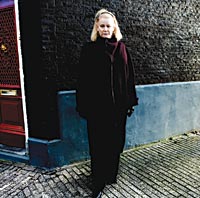For decades, Donald McCloskey was one of the boys-literally and figuratively. At six feet tall, the respected libertarian was an imposing, bearded University of Chicago economist with a ferocious reputation.
|
Photograph: Ulrik Jantzen/Getty Images
 |
|
Deirdre McCloskey in the Netherlands, where she is a visiting professor at Erasmus University in Rotterdam |
Yet, in 1980, in the middle of a successful career, McCloskey left Chicago for the University of Iowa and, 15 years later, underwent gender reassignment surgery. McCloskey returned to the city as a woman named Deirdre in 2000, lured by the University of Illinois at Chicago. This month, McCloskey publishes the first of a four-volume history of capitalism, titled The Bourgeois Virtues: Ethics for an Age of Commerce (University of Chicago Press; $32.50), which challenges long-held assumptions about laissez-faire economics and argues, provocatively, that markets support virtues like justice, love, and hope.
Q: During the last decade you have tackled a major personal change-your gender reassignment-and a major professional undertaking, the writing of Bourgeois Virtues, a sweeping defense of capitalism. Which did you find most challenging?
A: I’ve been working on the book for 12 years. Finishing it was very satisfying. But the biggest challenge was the gender change. Of course, there was opposition to both. I had to go out on thin ice in both cases.
Q: Was Iowa a difficult place to undergo gender reassignment?
A: On the contrary, it was amazing. The main newspaper, The Des Moines Register, got on the story early. They did a series [and] got the facts right and were careful. That helped a lot. The administration was wonderful. I was no longer welcome at my square-dancing club, but aside from that I got no hassling from ordinary folks.
Q: In Bourgeois Virtues, you say that capitalism is not simply a system of utilitarian self-interest; rather, capitalism is, at its roots, a highly ethical system.
A: Think of the transactions in our own lives. You have colleagues, and they become your friends. You buy a newspaper from a news agent. You go to the hairdresser. And these transactions become occasions for acquaintanceship, sometimes love. Humans, as Aristotle said, are political animals, meaning they like to be together. There’s an importance of community that the utilitarians deny.
Q: You say that capitalism isn’t about competition. Then what is it about?
A: The main jewel of capitalism is that it organizes astonishing cooperation. Take this plastic water bottle that I’m holding. Imagine how many people are involved in making it. Thousands of people had to be persuaded to do things, just at the right time. Not coerced. As Adam Smith said, payment is a kind of persuasion . . . the opposite is to be told what to do by the central planner or the cops.
Q: How is it possible to talk about the inherent virtues of capitalism at a time of epic scandals such as Enron, when even the most admired CEOs enjoy pay-and-bonus packages as their employees struggle?
A: The Enron accountants and CEOs should go to jail. It’s scandalous that CEOs are making absurd salaries. They’ve been corrupted by all this talk that all that matters is how much money you make. There is so little serious ethical talk.
Business schools are among the worst offenders. In business schools they’ll have courses on ethics whose main argument is to treat workers better, say, because it’s good for the bottom line. What they should be asking students is: What kind of person do you want to be?
Q: In recent years, you’ve attacked the economics profession, including your former colleagues at the University of Chicago, for being too theoretical.
A: The problem is not so much that they’re theoretical. What I have attacked them for is this obsession with proving theorems, derived from axioms about imaginary worlds, that don’t accomplish anything. Economists should be looking at and measuring things in the real world.
Q: Has your gender change impacted your career in any way?
A: It’s hard to know. I haven’t had any spontaneous job offers for 20 years. . . . But I’m a very odd duck in this profession, and people don’t like odd ducks.


